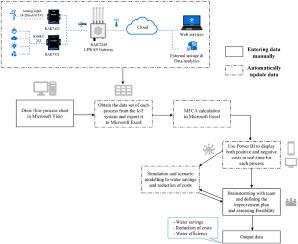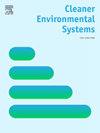一种新颖的综合物料流成本会计(MFCA)--物联网精益管理系统方法,用于提高饮料行业的用水效率并降低成本
IF 6.1
Q2 ENGINEERING, ENVIRONMENTAL
引用次数: 0
摘要
本研究旨在提出一种整合物料流成本会计(MFCA)、物联网(IoT)和精益管理系统的新方法,以提高饮料行业的用水效率并降低成本。分析了水净化、糖浆生产、浓缩液混合和包装的正负产品成本。MFCA 分析显示,正产品成本占 78.5%,负产品成本占 21.5%。通过使用 Power BI 应用程序实时显示各流程的正负成本、情景建模和模拟,能够促进节水和降低成本,并支持工厂团队从三个改进方案中选择一个:1) 在水净化过程中回收反渗透冲洗水;2) 在包装加温时通过自动 pH 值校正节约用水;或 3) 废水处理和反渗透盐水的回用。根据我们的两种节水方案测试,自动化工艺可改善包装过程中的 pH 值调节,而 MFCA、物联网和精益管理系统则可用于提高工业用水效率,从而展示了可持续用水的潜力。本研究中的饮料行业案例验证了这一方法,使生产率提高了 24.1%,成本降低了 4.5%,每年节约 71,010 泰铢。本文章由计算机程序翻译,如有差异,请以英文原文为准。

A novel integrated material flow cost accounting (MFCA)- IoT-lean management system approach to improving water use efficiency and reducing costs in the beverage industry
The purpose of this study is to present a novel approach of integrating Material Flow Cost Accounting (MFCA), Internet of Things (IoT) and lean management systems to improve water use efficiency and reduce costs in the beverage industry. The positive and negative product costs of water purification, syrup manufacture, concentrate mixing, and packing were analyzed. The MFCA analysis showed 78.5% positive and 21.5% negative product costs. The use of the Power BI application to display real-time positive and negative costs in each process, scenario modeling and simulation was able to promote water savings and cost reductions, as well as supporting factory team ideation for choosing one of three improvement plans: 1) RO flushing water recovery in water purification; 2) water conservation with automated pH correction at packaging warmer; or 3) wastewater treatment and reuse of the rejected RO brine. According to our two-scenario water conservation testing, an automation process could improve pH adjustment in the packaging process, while MFCA, IoT, and lean management systems could be applied to improve industrial water use efficiency, demonstrating the potential for sustainable water use. The beverage-industry case in the present study validated this approach, resulting in a 24.1% production rate increase and a 4.5% cost reduction of 71,010 THB savings per year.
求助全文
通过发布文献求助,成功后即可免费获取论文全文。
去求助
来源期刊

Cleaner Environmental Systems
Environmental Science-Environmental Science (miscellaneous)
CiteScore
7.80
自引率
0.00%
发文量
32
审稿时长
52 days
 求助内容:
求助内容: 应助结果提醒方式:
应助结果提醒方式:


